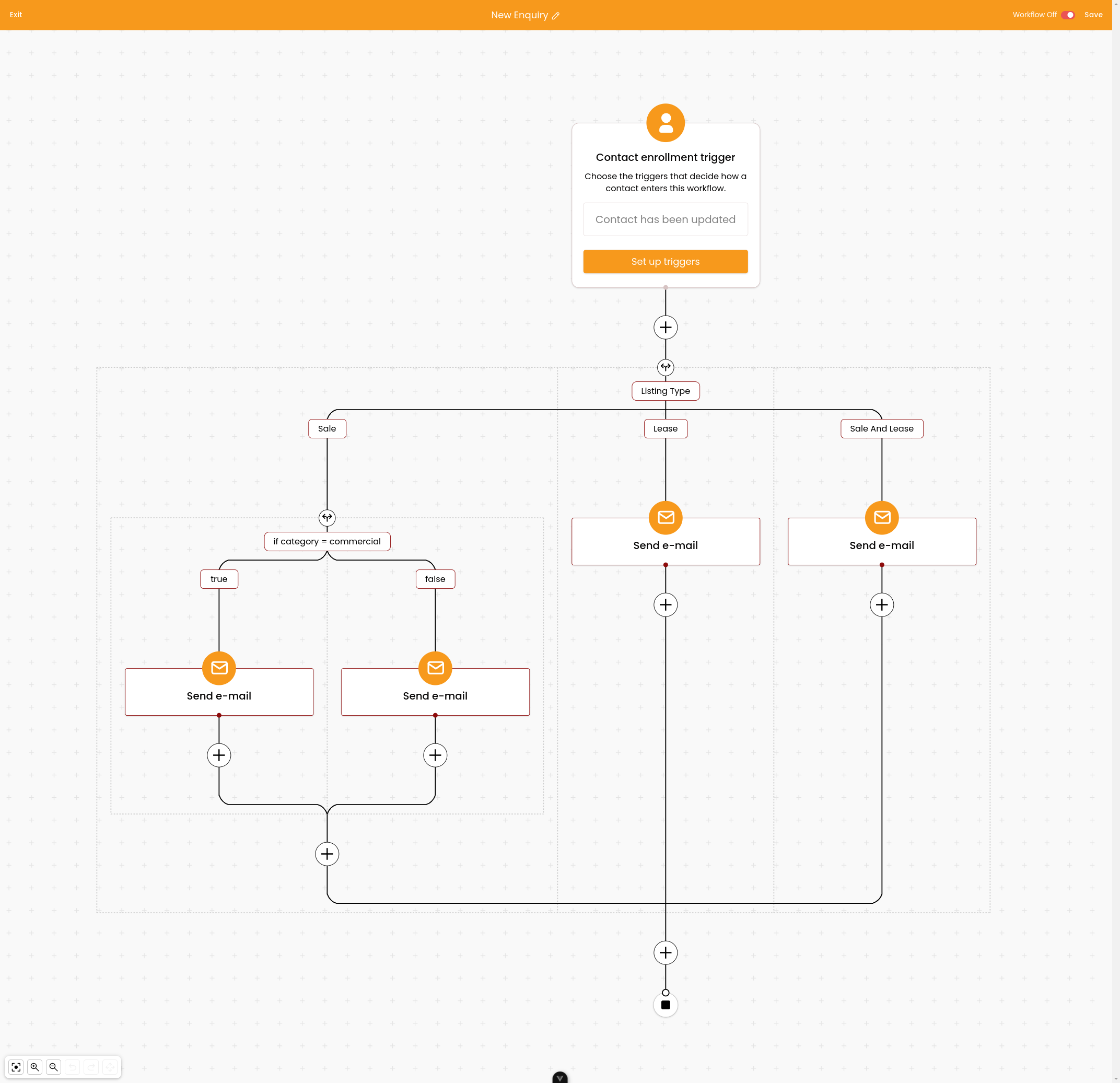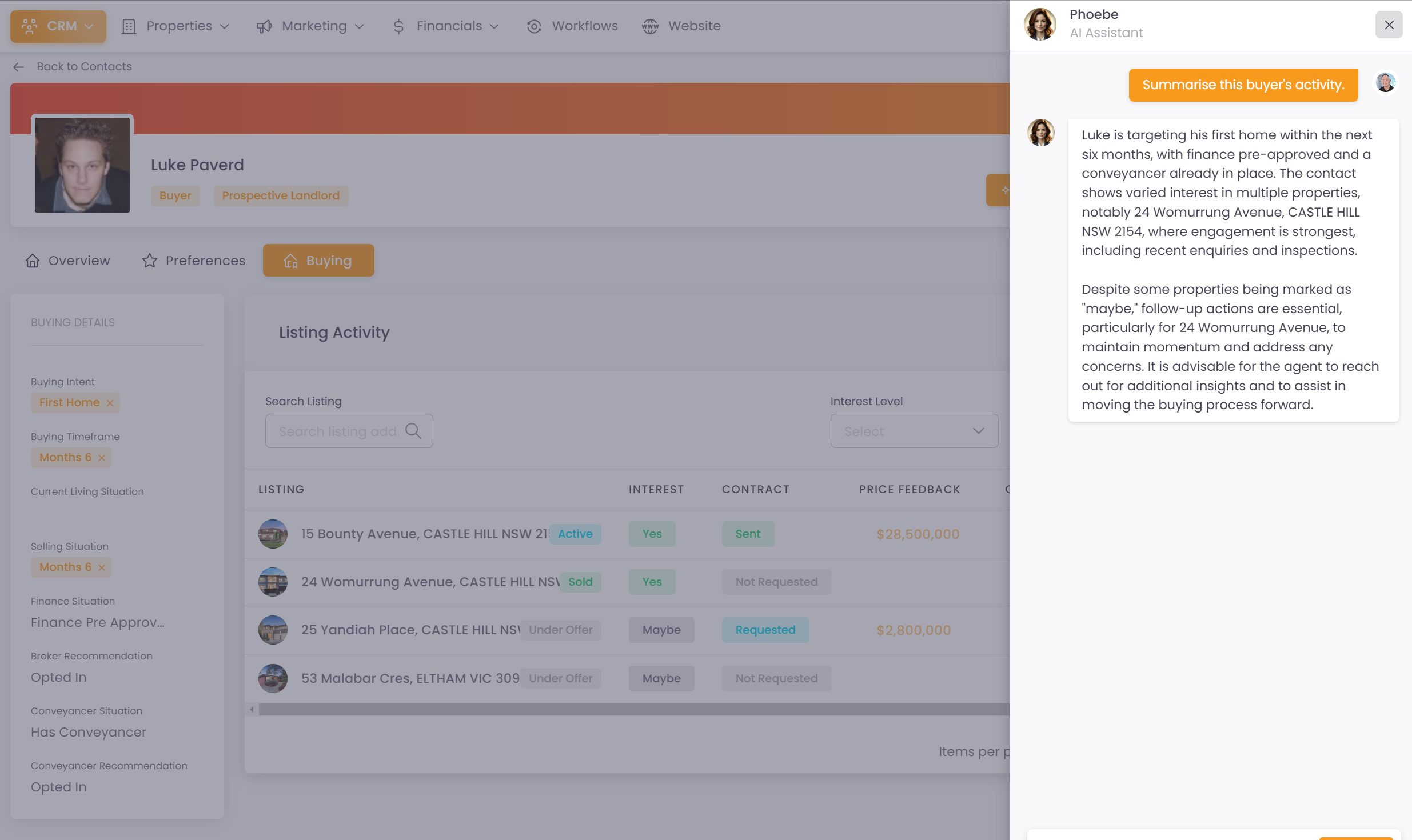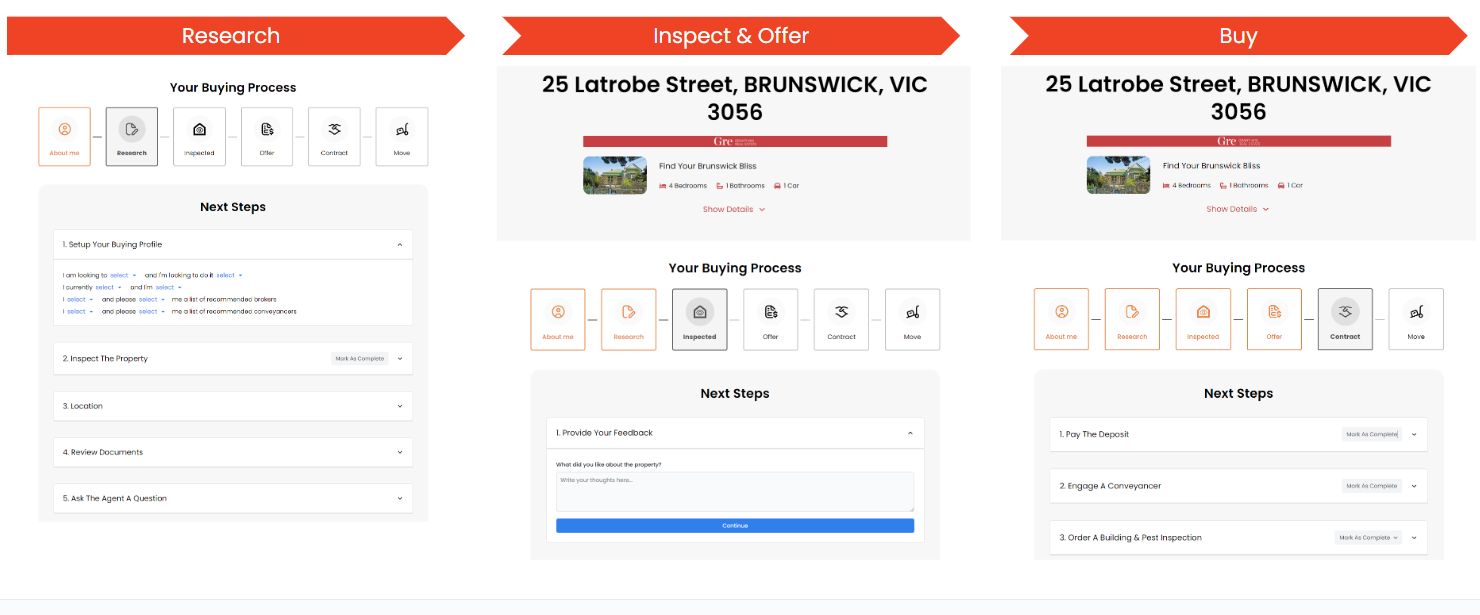18 Dec

The real estate CRM landscape in 2025 will likely see transformative trends driven by technological advancements and changing customer expectations. Here are some key trends to watch out for:
1. AI and Machine Learning Integration
Predictive Analytics is a sophisticated feature where the CRM leverages the power of AI to analyse vast amounts of data and identify patterns in customer behaviour. This allows the system to forecast potential actions that customers might take in the future, enabling real estate agents to focus their efforts on the leads that have the highest probability of converting into clients. By anticipating customer needs and preferences, agents can tailor their approach, ensuring a more personalised and effective engagement strategy.
AI-powered chatbots and virtual assistants are revolutionising customer service by providing real-time, interactive communication that is both efficient and user-friendly. These intelligent systems can handle a wide range of enquiries, offering immediate assistance and ensuring that the first point of contact is both smooth and inviting. The importance of first interactions cannot be overstated, as they set the tone for the entire customer experience. By utilising AI, businesses can ensure that responses are not only prompt but also relevant and informative, enhancing customer satisfaction and trust.
Voice recognition technology will advance to a point where some AI solutions can perform outbound calls on behalf of the agent, significantly streamlining the process of data cleaning and identifying new business opportunities. These AI-driven calls can verify and update customer information, ensuring that databases remain accurate and up-to-date. Additionally, by engaging with potential leads through voice interactions, AI can uncover new opportunities for business growth, identifying prospects that may have been overlooked through traditional methods. This innovative use of voice technology will empower agents to focus on high-value tasks, while the AI handles routine yet essential communication, ultimately enhancing the efficiency and effectiveness of the real estate CRM system.
In addition to these capabilities, AI can deliver personalised recommendations that guide customers through the next steps in their journey, such as booking a property inspection or accessing specific information they need. By analysing customer data and preferences, AI can suggest tailored actions that align with the customer’s unique requirements and interests, thereby streamlining the decision-making process and improving the overall customer experience. This level of personalisation not only helps in building stronger relationships with clients but also increases the likelihood of successful transactions.
2. Advanced Workflow Automation
Workflow Automation will revolutionise the way real estate professionals manage their daily operations by automating routine tasks such as email follow-ups, appointment scheduling, and contract management. This automation will become a standard feature in CRMs, significantly reducing the time and effort agents spend on these repetitive tasks, allowing them to focus more on building relationships and closing deals.

When a client triggers an action, such as filling out a form or making an enquiry, the CRM can automatically send tailored messages that are personalised based on the client’s previous interactions, such as enquiries, website visits, or even past purchases. This ensures that communication is not only timely but also highly relevant and specific to the customer’s unique requirements.
The use of conditional logic within these systems will further enhance the communication flow, enabling the CRM to adapt messages and responses to the specific context and needs of each client. This level of customisation and efficiency will lead to improved customer satisfaction and higher conversion rates, as clients receive the information they need precisely when they need it, without unnecessary delays or generic responses.
3. Hyper-Personalisation and Customer Insights
Enhanced data collection will allow CRMs to offer deeper insights into customer needs, driving highly personalised communication that resonates with individual preferences and expectations. By gathering and analysing a wide array of data points, such as browsing history, past interactions, and purchase patterns, CRMs can create a comprehensive profile of each customer. This enables real estate agents to craft messages that are not only relevant but also timely, ensuring that every communication feels personal and meaningful. The ability to understand and anticipate customer needs at such a granular level will transform the way agents engage with their clients, fostering stronger relationships and increasing the likelihood of successful transactions.

Behavioural tracking will become a key feature, providing agents with the tools to monitor and analyse customer actions and interactions across various platforms. This capability will help agents tailor their approach and timing of their messages, ensuring that they reach out to clients at the most appropriate time. By understanding customer behaviour, agents can refine their strategies, making their outreach efforts more effective and impactful. This level of communication will not only enhance customer satisfaction but also improve conversion rates, as clients receive information and offers that align perfectly with their current needs and interests.
4. Consumer-Related Tools
Modern consumers expect more from their interactions with real estate agencies than ever before. They demand instantan responses and high-quality service that meets their needs efficiently and effectively. However, this heightened expectation comes with a growing sense of scepticism and a decrease in trust. Consumers are increasingly wary of traditional sales tactics and prefer to have more control over their communication channels. They want the flexibility to choose how they interact with agencies, whether through email, phone, or digital platforms, and they want to dictate the timing of these interactions to fit their schedules and preferences.
Historically, CRMs have been designed primarily to support basic back-office functions and enhance productivity through streamlined processes. However, as consumer expectations evolve, so too must the capabilities of CRMs. A modern CRM should equip agencies with the necessary tools to deliver seamless, always-on, and high-quality automated consumer experiences that align with the demands of today’s market. This means integrating advanced features that go beyond mere data management to include personalised communication, real-time updates, and intuitive interfaces that enhance user engagement.
As we move into 2025 and beyond, the role of CRMs in the real estate industry will expand significantly. These systems will not only serve as repositories of information but will also become dynamic platforms that empower buyers, sellers, investors, and tenants throughout the moving process.
Advanced and forward-thinking CRMs will offer a comprehensive digital portal where customers can define their specific requirements, review detailed property information tailored to their needs, and make informed decisions with ease. This portal will provide customers with the opportunity to update their information, communicate directly with their agents, and access a wealth of resources that would traditionally be sent via email or delivered in person. By offering these innovative tools, real estate agents can strengthen their relationships with clients, fostering trust and loyalty. Moreover, agents who embrace this new philosophy will gain a distinct competitive advantage over those who cling to outdated methods, positioning themselves as leaders in a rapidly changing industry.

5. User-Friendly Experience
Many of the most widely utilised real estate CRM solutions have been around for quite some time, and unfortunately, the design of these systems, along with the overall user experience, has not evolved to keep pace with modern technological advancements and user expectations. As we look towards 2025, it is evident that real estate agents will increasingly demand CRM systems that are not only more user-friendly but also more aligned with the dynamic nature of their business operations.
The importance of this shift cannot be overstated. Historical evidence clearly indicates that when CRM systems are cumbersome and difficult to navigate, agents tend to avoid using them altogether. This avoidance results in fragmented operations, where crucial data is scattered across multiple platforms, leading to inefficiencies and misalignments between individual agents’ activities and the broader objectives of the office. Such disjointed operations can hinder productivity and ultimately impact the agency’s bottom line.
To address these challenges, agency principals must prioritise equipping their teams with CRM systems that are modern, intuitive, and easy to use. These systems should be designed with the end-user in mind, offering seamless navigation and functionality that supports agents in their daily tasks. Investing in user-friendly CRMs is not just a matter of convenience; it is a strategic decision that can prevent the wastage of valuable resources, including time, money, and effort. By adopting CRMs that are straightforward and efficient, agencies can ensure that their operations are cohesive, data is centralised, and agents are empowered to focus on what they do best—building relationships and closing deals.
6. Mobile Accessibility
Real Estate Agents rely heavily on their mobile phones as indispensable tools in their daily operations. The ability to access and manage information on-the-go is crucial. Therefore, having a CRM mobile app that can perform a wide range of tasks will become increasingly important in the future. Agents need to be able to seamlessly add property inspections, record client feedback, and send both emails and text messages, all while ensuring that this information is accurately stored against the relevant contact and property records within the CRM system. This capability not only streamlines their workflow but also enhances their ability to provide timely and efficient service to clients.
Moreover, in some states, legislation mandates meticulous record-keeping of all interactions with consumers. This means that the ability to quickly and efficiently record information into the mobile app is not just a convenience but a legal necessity. The app must be designed to facilitate easy data entry and retrieval, ensuring compliance with these regulations and safeguarding the agent’s professional integrity.
In addition to these requirements, agents need immediate access to new enquiries and follow-up tasks, which are often stored within the CRM. However, these need to be accessible while agents are out of the office, attending property inspections, or meeting with clients. An easy-to-use and highly functional CRM mobile phone app is, therefore, an essential tool that empowers agents to perform their work effectively. It allows them to stay connected, manage their schedules, and respond to client needs promptly, ultimately enhancing their productivity and success in the competitive real estate market.
7. Data Security, Anti-Money Laundering & Privacy Enhancements
With the increasing concerns over data privacy, CRMs will be compelled to adopt more stringent compliance features to align with the updates to Australia’s Privacy Act. This will involve implementing advanced security protocols and ensuring that all data handling processes are transparent and accountable. The emphasis will be on safeguarding personal information, thereby building trust with clients who are increasingly aware of their privacy rights.
In addition to privacy concerns, Australia is set to follow New Zealand’s lead in ensuring that real estate agents comply with Anti-Money Laundering (AML) laws. This will necessitate the integration of comprehensive customer due diligence procedures into real estate CRM systems. These procedures will include verifying the identity of clients, monitoring transactions for suspicious activity, and maintaining detailed records to prevent illicit financial activities. By embedding these AML compliance measures into CRMs, real estate businesses can not only adhere to legal requirements but also enhance their reputation for integrity and reliability.
Furthermore, multi-factor authentication will become a standard security measure for accessing CRMs and other systems within the office environment. Given that real estate offices manage substantial funds in their trust accounts, they have become attractive targets for cybercriminals. To counteract this threat, CRMs must ensure that only authorised users can access sensitive information. Implementing multi-factor authentication, which requires users to provide two or more verification factors to gain access, is a robust way to protect clients’ money and uphold the real estate business’s reputation. This added layer of security will help prevent unauthorised access and potential data breaches, thereby reinforcing the trust clients place in their real estate agents.
If you’re planning to upgrade your CRM for 2025, contact us today to discover how the Phoenix Software solution can usher your agency into the next generation of CRM.



